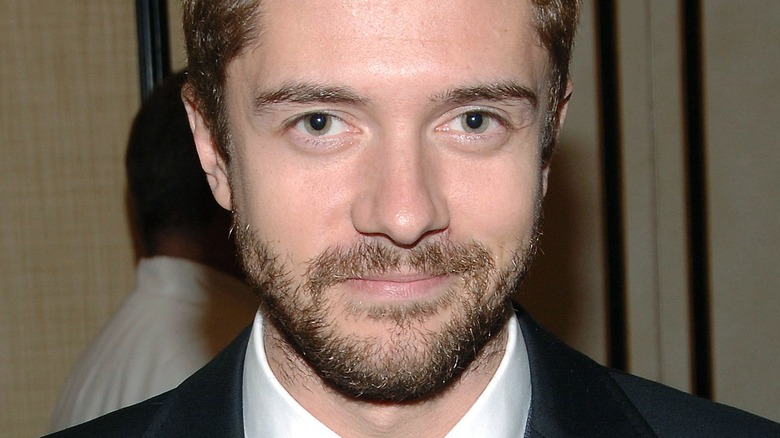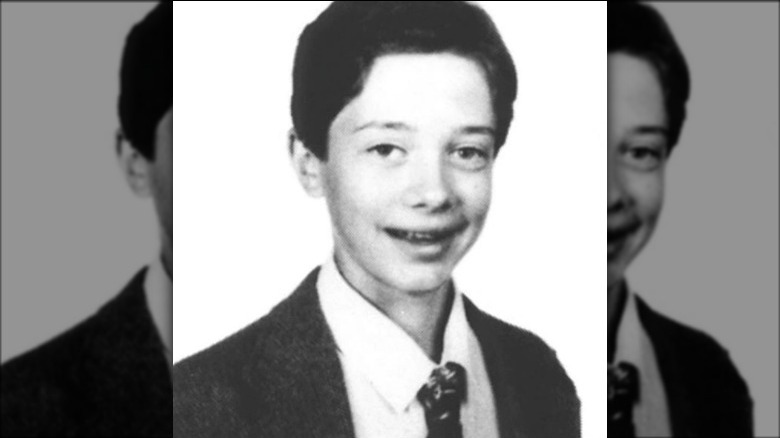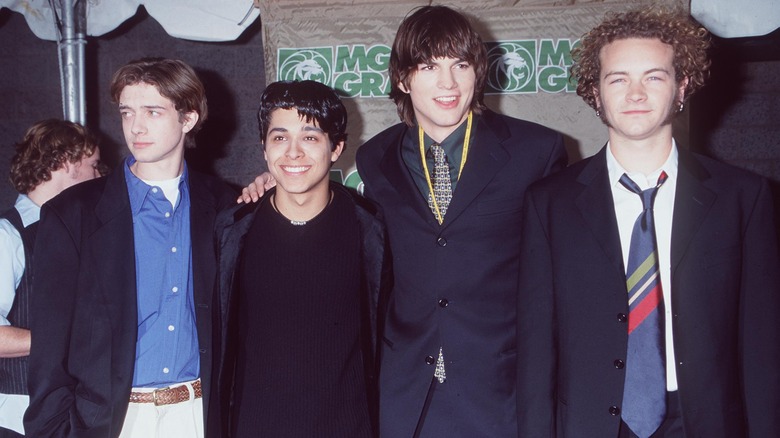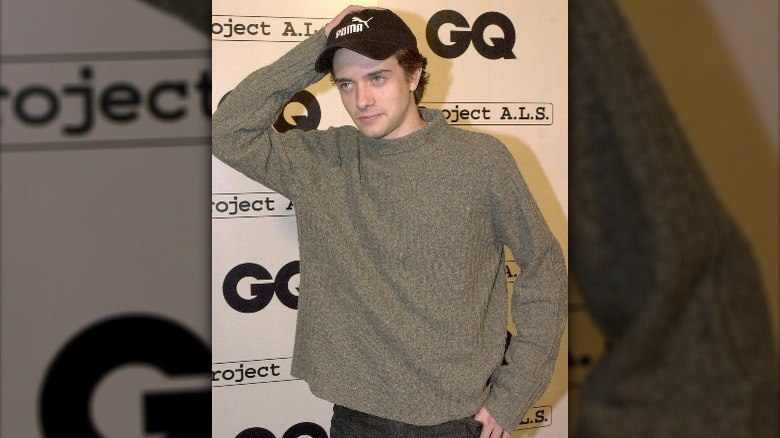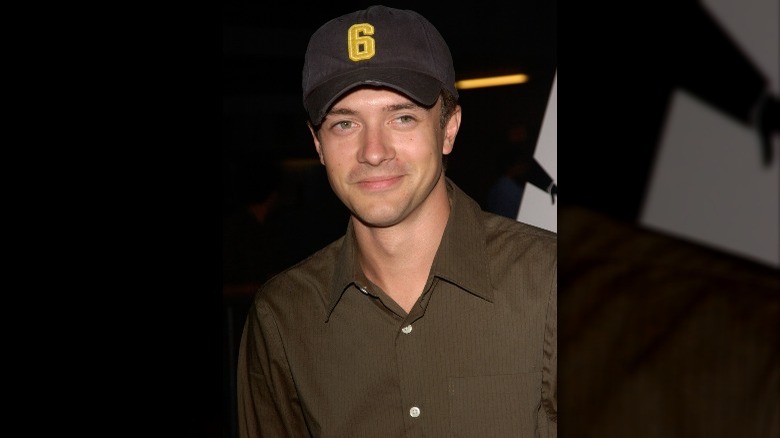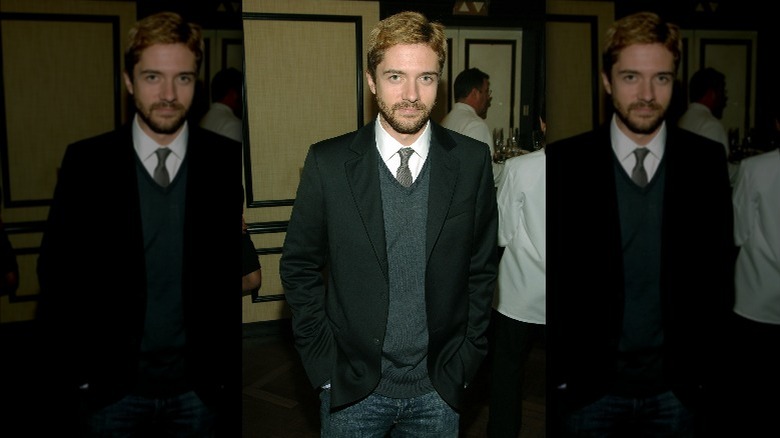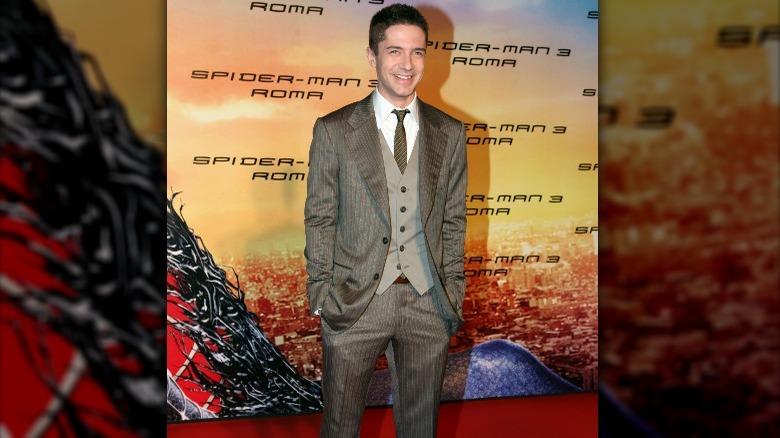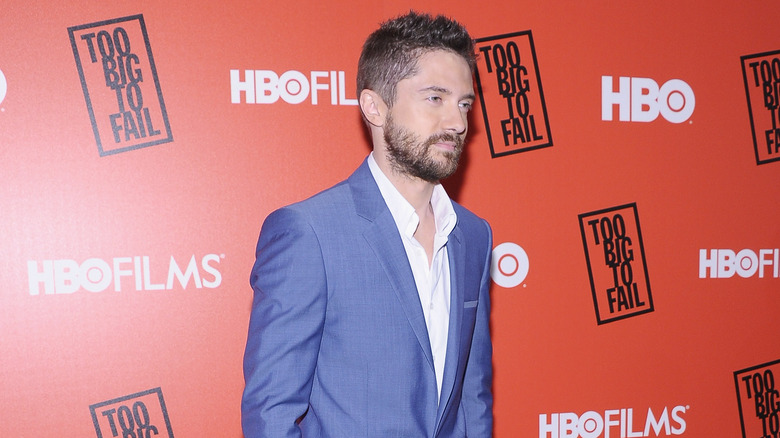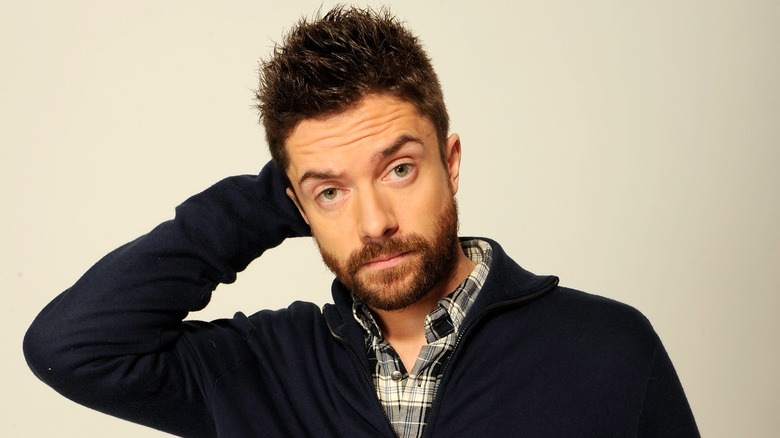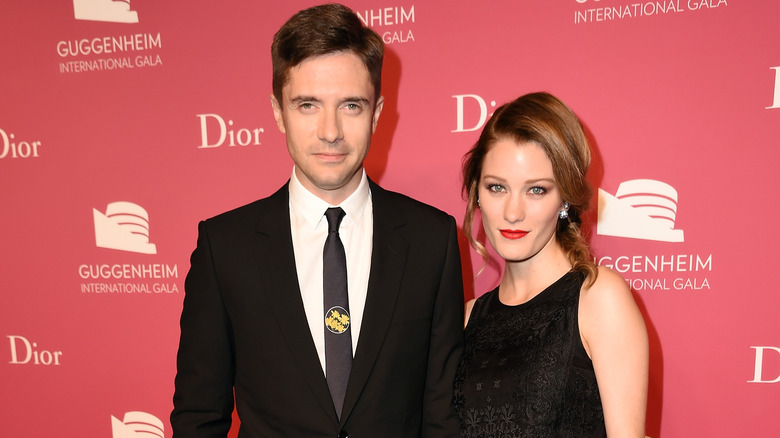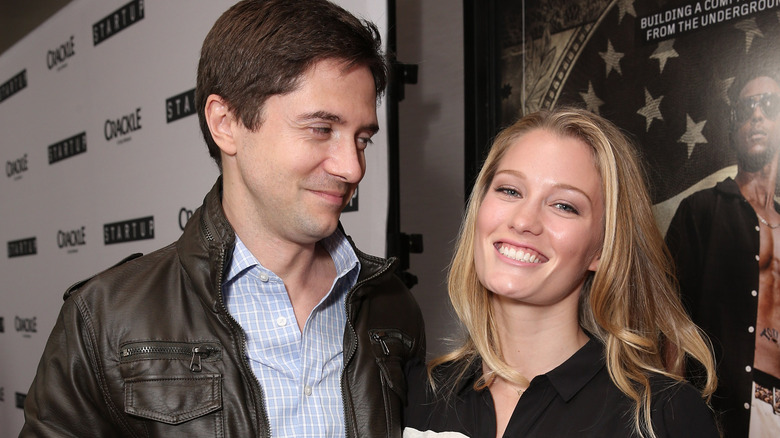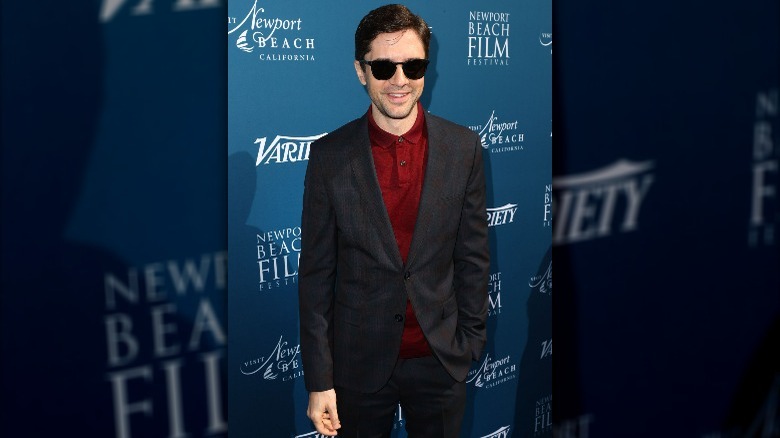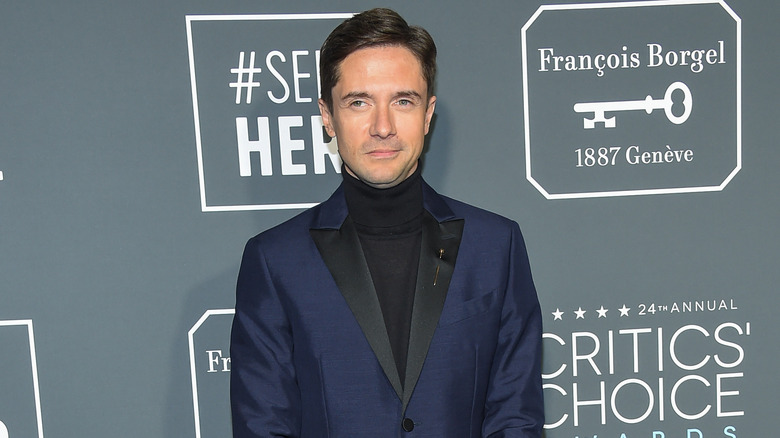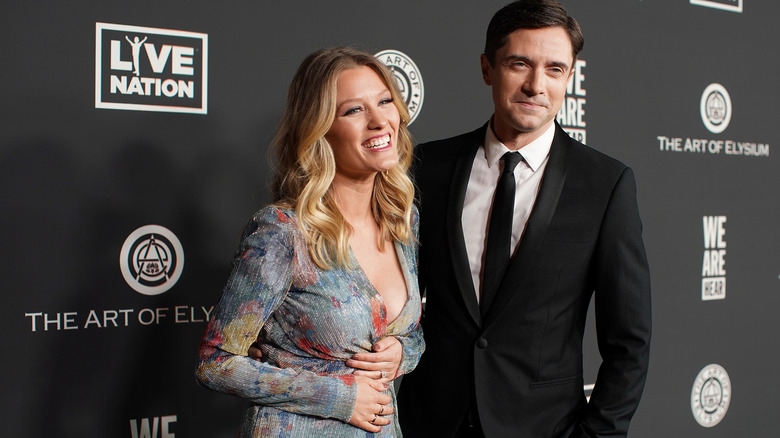The Transformation Of Topher Grace From 16 To 43 Years Old
To many, the actor who gained fame as the basement-dwelling "dumbass" of "That '70s Show" will forever and always remain known as Eric Forman. As the transformation of Topher Grace proves, however, the actor has a lot more to offer than just nostalgic quips about "Star Wars" and rocking some impressive flares.
Growing up, Grace tried to go by the name Christopher, but his peers insisted on calling him Chris. He'd correct them by adding the "Topher," eventually joking that he should go by the latter half of his name. "And the hottest girl in school said, 'That's cute,'" he recalled on "The Ellen DeGeneres Show."
Since leaving the sitcom that made his nickname a household name, Grace has managed to develop a fascinating career for himself where he's transformed into something of a well-respected character actor. By all accounts, the star has rarely followed convention during his later career: He's often favored culturally interesting projects over gainful ones.
The result is an actor more comfortable with ensemble pieces than playing the lead, an artist whose career has been so low-key — yet prolific — that some people may have wondered where he went, when he's been right there, working away this entire time. So what happened to him? And how did he change from his early days to now? Step into the Vista Cruiser and blast some Cheap Trick with us, because this is the transformation of Topher Grace from 16 to 43 ... Hello Wisconsin!
The casual school production star
As a teenager, Topher Grace was seemingly not aiming for showbiz success, but the Hollywood cosmos was aligned in his favor, regardless. The young star-to-be attended school in Darien, Connecticut, a town described by USA Today as being "quite the celebrity breeding ground."
The school churned out notable stars like Moby and Grace's "Win a Date with Tad Hamilton!" co-star Kate Bosworth, as well as perennial it-girl Chloë Sevigny — his babysitter growing up. "She was cool because she used to let me stay up late," he told the publication. His family, meanwhile, wasn't very showbiz at all: According to USA Today, his dad was a New York businessman and his mom was an office worker. Speaking to New York Magazine, Grace confirmed that growing up with parents who had normal, everyday jobs infused him with a strong and realistic work ethic. "I certainly like working harder than a lot of my peers," he mused.
This is perhaps why, when faced with a sporting injury at school, he chose not to simply rest up but to casually stride into a whole new challenge: Acting. "I was on the varsity tennis team and I had this injury," he explained to OZY, "I thought, 'Yeah, I'm going to do the [school] play.'" Grace subsequently starred in school productions such as "The Wizard of Oz" and "Annie Get Your Gun" — and eventually, his acting attracted the attention of some influential people.
Topher Grace hit the big time in no time
Some people spend their whole lives hustling for a breakthrough role in Hollywood. And other people, like Topher Grace, just casually trip over a big opportunity, shrug their shoulders, and take it. He later attended a boarding school in New Hampshire, and as the actor told OZY, "the girl who did the sets" of the school productions he starred in had parents who were "big-time Hollywood producers." Clearly, he made an impression on them. When they were looking "for kids who are not like the typical Hollywood kids," Grace was on their Bingo card, and "That '70s Show" was the grand prize.
Luckily, Grace felt right at home among the rest of the similarly inexperienced young cast who "had never acted" professionally either. Wilmer Valderrama "barely spoke English," and Ashton Kutcher and Laura Prepon were both models. "That was literally my first audition," Grace told Deadline, "Now that I have a bunch of years on me, I can see how brave it was for them to choose these kids who had zero experience."
In 1998, the show premiered, and it became an instant TV hit, one that helped Topher become confident in his abilities. Speaking to Slate, he confessed that he appreciated having a sitcom for a "training ground" as an actor. "When you stink — which I did, frequently at the beginning — you get to come back the next week and get better," he said. Soon, he'd have even bigger training wheels to level up with.
Shuffling into movies
After proving his comedic mettle with "That '70s Show," Topher Grace was ready to try out his newly improved acting skills in the big leagues. In 2000, the actor scored a role in Steven Soderbergh's Oscar-winning drugs drama "Traffic." It was a huge departure for the actor, who was used to working in the safe contrivance of a closed-off set. Now, he was shooting outdoors "in dicey parts of Cincinnati." He told Deadline that he subsequently learned a great lesson from working with the indie film legend: "Sometimes filmmaking is artifice and sometimes it's reality, and there's no wrong way to do it."
In 2001, those lines certainly blurred when Grace enjoyed a standout cameo in "Ocean's Eleven." The role demanded that the star depict a bratty, idiotic version of himself learning poker among other "Tiger Beat" faves like Joshua Jackson and Shane West — something that he appeared to do with relish: He brags about winning with a failed hand, and smugly refers to thousands of dollars in play as being "pocket change."
The joke works especially well because, at the time, Grace was notably low-key and modest, regularly strutting out in his uniform of a baseball cap, jeans, and a nondescript top. He might have been earning a rumored $250,000 or more per episode, as reported by Entertainment Weekly, but he seemingly had little desire to act or dress like a typical celebrity. Did Hollywood even know what to do with a young actor like that?
Topher Grace is an everyman with a dark side
Luckily, many in the industry saw potential in Grace's underplayed star quality. Between 2003 and 2004, he scored roles in fairly big mainstream fare including "Mona Lisa Smile," "Win a Date with Tad Hamilton!," and "In Good Company." Speaking about the latter, director Paul Weitz told Entertainment Weekly that Grace's "weird combination of innocence and cynicism" was attractive to him during casting, adding, "He has the capacity to be not just an Everyman, but an Everyman with some darkness to him."
It gave Grace an odd appeal: He was charming enough for the mainstream, but he was also something of an outlier. There weren't many other 20-something stars at that time undermining their success by showing up to red carpets wearing baseball caps, after all. In reprising his meta-role as a version of himself in "Ocean's Twelve," his dark, outlier demeanor gave him even more freedom to poke fun at himself. Jokingly making reference to "In Good Company," he tells Brad Pitt's Rusty, "I totally phoned in that Dennis Quaid movie."
Six years into his career, he was confident enough to take potshots at himself, but he was apparently still in his salad days. "Taking dance lessons with Julia Roberts," for instance, was as humbling as it was educational. He told Deadline of his "Mona Lisa Smile" co-star, "Seeing how she handled herself was a lesson for an idiot like me who kept stepping on her feet."
Goodbye Wisconsin!
Having found critical success and personal fulfillment from working in cinema, Topher Grace decided to leave "That '70s Show" in 2005. As reported by the Chicago Tribune, the actor exited the show at the end of Season 7 "to concentrate on film offers." Speaking to IndieWire in 2018, Grace recollected that he told his agents, "I don't want to do anything but work with auteurs" — a sentence that apparently triggered colossal money alarms for those responsible for cutting the deals.
However, his sitcom role was lucrative, and it gave him newfound freedom. "I didn't care [about the size of the role or the salary]," he reasoned, "It's what I wanted to do with my life." The decision marked a notable change in the actor, and he appeared to now be dressing for the career he wanted. For starters, Grace's beloved baseball caps made less of an appearance, and the star was now adopting some chic-yet-casual ensembles that made him resemble an especially preppy Wes Anderson character. One who was maybe still growing into his blazers.
In an interview with GQ, the actor likened his growth on "That '70s Show" to the experience of the lead actor of the movie "Boyhood," who was filmed maturing over the course of 12 years. "I was 19 to 26 or something. That was a very long time," Grace said, adding, "no one gives sitcoms this kind of credit, but they span a long period of people's lives."
Maintaining an oddball balance
Sure his agents were worried, but they needn't have been: Topher Grace's decision to switch gears in his career, though drastic, paid off. In 2007, the star landed the coveted role of Venom in Sam Raimi's "Spider-Man 3." Plenty of keyboard warriors were incensed at the casting decision, with GamesRadar describing Grace as "a whiny 'That '70s Show' reject" whose take on the character made for "one of the worst film baddies ever" — a harsh take for a film where Peter Parker inexplicably disintegrates into a disco Pete Wentz.
His depiction may not have been popular, but the role allowed Grace to flex his capacity to tap into both the light and the dark of his characters. Speaking to Collider about getting into "a dark place" for the role, he explained how "happiness, sadness, being mean and being nice" all exist on the same level. "My goal in my career is to ... find characters that have that kind of balance too."
Considering he followed up the role with performances in the horror-action flick "Predators" — wherein he played a wimpy nice guy who's revealed to be a misogynistic serial killer — and the ensemble rom-com "Valentine's Day," his career was certainly maintaining that balance. Grace's newfound movie star kudos translated to his style — the actor stepped up his red carpet game. Sadly, he could still look like a boy forced into a tie and slacks by his mom for a family party. But that would change.
Topher Grace finds an indie comfort zone
Now in his 30s, Topher Grace appeared comfortable with his artistic voice as an actor, and it came through in his choice of looks. Gone were the generic red carpet threads which made Grace appear as though he were observing convention with correct attire. In their place were well-fitted suits, which made unique, coltish statements — such as the powder blue Calvin Klein number he wore with an unbuttoned shirt to the premiere of his HBO film "Too Big To Fail," per KMO. Finally, he had looks that reflected his idiosyncratic perspective as an actor.
His career was flourishing and on his own terms. In 2011, the '80s-set romantic comedy "Take Me Home Tonight" was released, and on top of acting in the vehicle alongside Anna Faris and Chris Pratt, he was also a producer. Unlike "That '70s Show," the film didn't riff on the era during which it was set with nostalgia punchlines. "Back in the '70s, no one said, 'What's up with these bell bottoms?'" Grace told The Washington Post. "We wanted to lose all those lines where someone goes, 'How small is this cellphone?.'"
Grace relished the freedom he found in indie cinema. When he starred in "The Giant Mechanical Man," for instance, he praised the independent flick for letting him play "a really smarmy guy," an antagonist that he'd "never get [the] chance" to do in a mainstream feature, as he explained to The Hollywood Reporter. Creatively, he'd found a home.
The editor strikes back
Just because he was thriving isn't to say Topher Grace didn't still make career missteps. In 2013, he starred in the ensemble comedy "The Big Wedding," which critics were fairly united in loathing. Be that as it may, he managed to maintain positive acclaim for his performance as "a 29-year-old virgin" who suddenly has his head turned. Entertainment Weekly, for instance, bemoaned the film for being "corny and contrived," but praised Grace for approaching the "sitcom setup ... with elegance."
A year earlier, the actor had achieved a different kind of elegance via a Jedi mind trick wherein he convinced the world that he was now an editor. In 2012, Slash Film reported that Grace had edited all three "Star Wars" prequels into one snappy, 85-minute film that was "cleverly trimmed" to "remove the fluff."
As stated by the website, the "interesting experiment ... is probably the best" of all the fan edits available online. Contrary to popular belief, Grace — unlike Eric Forman — isn't "a huge" fan of "Star Wars." Rather, as he told GQ, editing is simply a hobby he does with a friend. "It's kind of like a dad band thing, except ... even nerdier," he explained. He may not have been a "Star Wars" fan, but his look during this time — the plaid shirt and navy sweater seen above — is notably riffing on the mainstay look of "Star Wars" creator George Lucas. It's a statement for sure.
Love and rockets
For the majority of his career, Topher Grace had managed to keep a tight lid on his personal life. Who was he dating? Was he single? The tabloids weren't privy to his romantic entanglements. But that changed at the start of 2014 when the actor was reported by Just Jared to be dating "True Blood" actor Ashley Hinshaw. A year later, People reported that the two were engaged. Love appeared to have worked wonders on the star's fashion sense, with Grace suddenly adopting a much more sophisticated look that complemented that of his partner.
Professionally, Grace found himself stepping to a creative rhythm that suited him. As shared during an interview with The Wrap, he was still re-cutting famous films, with "Boogie Nights" enjoying an abbreviated edit by his hand. As he once told HuffPost, the process helped him to better "understand the medium" of film and his own acting approach. Certainly, he was making stronger choices that suited him. On top of starring in Chris Nolan's "Interstellar," the star also enjoyed hamming it up as a villain in the stoner-action flick "American Ultra."
As Entertainment Weekly posited about Grace, such roles suited his "self-awareness" in playing against the "lovable nerd" role Hollywood attempted to foist upon him. "It read as endearing on television," they wrote, "but in movies it reads more nefarious." As his role in the 2015 political drama "Truth" would suggest, he would soon use those same skills to engage artistically with politics.
A full-circle realization for Topher Grace
While in conversation with GQ, Topher Grace, who once dated Ivanka Trump, per the Daily Beast, reflected that when it comes to politics, "There's very little you should say, as an actor." Instead, he argued that he likes "to put" what he sees in the news into his performances. This sentiment formed the foundations of Grace's next phase of work, and he certainly seemed to embrace it when he starred in the 2017 war satire "War Machine."
Inspired by a true story of combatant incompetence investigated by Rolling Stone writer Michael Hastings, Grace plays a bumbling military press advisor who "blew it," as he told Brief Take. The project also gave the star another opportunity to delve into the blurred parameters of a story where "the truth is stranger than fiction," as well as a chance to reunite with Brad Pitt. As reported by Biff Bam Pop!, Grace was only 19 when he first met Pitt on the set of "Ocean's Eleven." Grace credited the star's efforts to make him "feel very comfortable" on set with helping him to put his "best work ... on camera." Almost 20 years later, he'd proudly come full circle with the Hollywood legend.
Everything appeared to click for Grace as he approached his 40s, including his relationship with Ashley Hinshaw. In 2016, People announced that the couple had married at a ceremony in Santa Barbara, and a year later, the two celebrated the birth of their first child, daughter Mabel Jane (via E!).
Finally, some recognition
With his career trajectory orbiting confidently around stories with a political edge and indies with an odd appeal, Topher Grace hit his stride in 2018 with two critically acclaimed performances that perfectly fit his modus operandi: Spike Lee's Oscar-nominated satire "BlacKkKlansman" and David Robert Mitchell's slacker noir "Under the Silver Lake." Speaking to IndieWire, Grace reflected that being at Cannes promoting both films validated his initial mission plan all those years ago: Money be damned, he wanted to work with filmmakers he admired.
"I feel like it's a confirmation of how I've been working with for the past few years," he explained. While "Under the Silver Lake" earned him indie cool points, he was still playing "Super Mario Bros." between takes with Andrew Garfield, according to Empire, so his nerd side was still very much alive and well. On red carpets, however, Grace took his moment in the spotlight to bask in his coolness, pairing suits with shades as though his newfound limelight was so bright he needed UV lenses for it.
Certainly, he'd earned it. In depicting former Ku Klux Klan leader David Duke in "BlacKkKlansman," Grace admitted to Deadline that despite not having "that deep a process," he still struggled to embody the intense "evil" of his character. Explaining that Lee had to reassure him that "this is a movie" with an important message behind it, Grace explained that regardless, "I found it hard to deal with it because [the character had] so much hate."
Topher Grace delves into dystopia
Hot off his successful year as an indie darling, Topher Grace doubled down on using his acting to engage with social and political discourse in some interesting ways. The actor journeyed into his 40s with a performance in an episode of Charlie Brooker's technological dystopia show "Black Mirror."
Appearing as a monstrously powerful tech mogul "who sees himself as this switched on, liberal, hippy kind of guy," as Brooker described him to Dazed, the role was once again rooted in Grace's comfort zone: A character with relatable human flaws who's perhaps blissfully unaware of the extent of his own villainy.
Wearing a man-bun wig for the role, Grace explained to Vulture that his look was riffing on how tech entrepreneurs use very consciously crafted branding "to maneuver through the media easily." Grace's keen observational skills were clearly helping to root his characters in uncomfortable truths — something which became disturbingly clear when he starred in the pandemic drama "The Hot Zone" a year before the COVID-19 pandemic happened.
During a panel interview with Deadline, Grace used the example of how science suggests California is "overdue for an earthquake" to talk about how distance from the last disaster makes us relaxed and vulnerable for another. He argued we've likewise been "lulled into a sense of complacency" about a potential pandemic, too. As he told GQ, his statements weren't very popular. But damn, they turned out to be uncomfortably prescient.
A dad, from all angles
By his 40s, Topher Grace had officially become comfortable in his sense of style. For the past few years, the contentment and confidence he found professionally and in his personal life was reflected in the sturdy, dynamic suits he chose to grace red carpets in. Finally, and officially, he didn't just look comfortable in formal wear — particularly next to his wife — he looked proud to wear it, too.
In 2020, he and Ashley Hinshaw welcomed their second child, and as Grace told GQ, it informed his new performance as a writer balancing work with caring for two very young children in the comedy series "Home Economics." Bringing the star full circle and back to his sitcom roots, he suggested that the character was going through a similar time as him. "I understood that underwater feeling you have when the kids are really young," he said, "and you're trying to live out creative passions."
As has been the case for so many of Grace's projects and performances, the role blurred boundaries between reality and fiction. "It was like, is this even acting?" he confided to Deadline, "I'd be home changing diapers, and then I'd clock in at work and they'd hand me two diapers." It was a suitable transformation for a star who performed between artifice and reality for much of his career. Having spent his formative years growing up on screen in "That '70s Show," Grace was now maturing as a father — on-screen and off.

